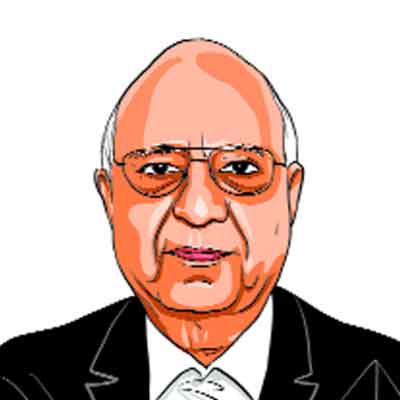Opinion Set the House in order
A message from the president could help end the logjam in Parliament
Day after day,proceedings in the two Houses of Parliament have been stalled. Questions are being asked about the grounds for the impasse and the way out. The problem is more fundamental than it seems,and both the ruling coalition and the opposition are responsible for the state of affairs.
In a parliamentary polity,the majority rules with the consent of the minority. Opposition is an essential partner in the democratic process. Along with the right of the majority to stay in power,the relevance and legitimacy of the opposition have to be respected. Unfortunately,in the parliamentary counter-culture we have developed,government is considered a perennial criminal by the opposition,while those in power use all possible means and resources of the state to discredit the opposition. The so-called constraints of coalition politics mean that many small groups of allies and outside supporters are allowed to blackmail the ruling alliance,demand their price,indulge in scams and loot the public exchequer. Meanwhile,the main opposition is often not even shown the courtesy of being consulted on crucial national issues.
As for creating pandemonium and not allowing the Houses to function,each of the major parties,when in opposition,behaves in exactly the same manner. When the roles are reversed,it lectures on the virtues of disciplined conduct and orderly debate. Offers of debate and willingness to discuss every issue on the floor of the House may seem very gracious but unreasonable prior conditions are often imposed. Discussion on a substantive motion that must be decided by a vote in the House is sought to be avoided. If the government is forced into a no-confidence motion or the like,there are allegations that it has swung votes by promising ministerships,hefty financial packages or reprieve in pending criminal cases. All this has led to a growing distrust in parliamentary processes and the devaluation of democratic institutions.
It may be argued that with the allegations of corruption and the scandals involving ministers,the present government has lost the moral right to rule,that the opposition may be within its rights to ask the prime minister to resign. But political morality cannot be forced. Constitutionally,the government is legitimate and entitled to continue so long as it commands a majority in the House.
The second issue is that of the office of the CAG. Financial control of the administration is the bulwark of parliamentary democracy. Accountability and transparency the two cardinal principles of good governance in a democratic set-up depend,to a large extent,on how well the public audit function is discharged. It is for this reason that the CAG has been given special status by the Constitution. It is his responsibility to ensure that money is spent and revenue raised not only in accordance with the law,but also with due regard to economy,efficiency and effectiveness. The CAG is the constitutional authority entrusted with the responsibility of maintaining probity in the use of public funds. As an agency functioning on behalf of the legislature,CAG has to ensure that the executive complies with the Constitution and the laws.
The CAGs reports are to incorporate important audit findings,performance reviews of systems,projects and programmes as well as comprehensive appraisals of public enterprises and other authorities. He also reports on acts that infringe on the countrys economic interest,such as mass embezzlement of state assets,serious losses and wastes.
CAG reports are submitted to the president,who ensures they are laid before each House. They are then referred to the public accounts committee (PAC),which can select some sections for scrutiny. The CAG assists the PAC; he can share his audit reports with the public and media after laying them before Parliament. The CAG seeks to enhance the executives accountability to the Parliament and to state legislatures by carrying out audits in the public sector,and providing accounting services in the states,in accordance with the Constitution as well as with the best international practices.
In the case of coal,the contents of the report were leaked to the media before being laid before the Houses of Parliament,and much before the PAC considered it,government circles started questioning the rights of the CAG. The opposition,meanwhile,began accusing the government of fraud and of causing a huge loss to the public exchequer. It was prepared to settle for nothing less than the resignation of the prime minister. Both may be guilty of bypassing the PAC,interfering in its jurisdiction and showing it contempt.
Unfortunately,of late,we have also been witness to doubts cast on PAC members that they did not act on non-party lines and present unanimous reports. The memory of the abortive PAC report on 2G spectrum is still fresh. Where do we go from here? Will the president agree to send a message under Article 86 of the Constitution? If he does,it would be difficult for the Houses not to consider it,with all sides present.
The writer is former secretary general of the Lok Sabha
express@expressindia.com


